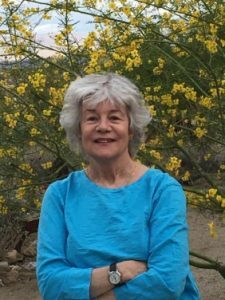From the unpublished manuscript, Transit Of Mercury
Cover art: Photo courtesy of Pixabay.
WHAT TIME FELT LIKE
It was always the problem with time, the supposed
beeline from now until next year, the change
that’s hovering, a scent, a buzz, a pitch out there,
and a closing in. Then it was stalking me,
a quiet, mysterious animal, not quite threatening
yet, but at my heels. Though often, blessedly
in spring, ordinary time burst upon me with its stench
of skunk cabbage in the meadow,
its luxuriant leaves lascivious and taunting.
There were meals and bedtimes, go-to-school times,
sneakers too small, the toothpaste gone,
the dog dying, the milkman leaving his bottles late,
sunrise from the window, trees growing leaves,
discarding them.
Time was baffling, the clocks, so many clocks
with slightly differing times, seconds and hours
pecked at or chimed, while someone in another room
kept his foot on the piano pedal, his hands and voice
keeping time, bringing it to life, bringing the feel of time
into the summer air as day exhaled dust motes in the sunlight.
UP FROM THE PALE GREEN ROOTS
The early world into which we burrowed was fairly
rotty: the fetid asparagus patch as morning warmed,
that fertile chicken coop where we stooped to scrape
the caked stuff, those sweet, dim birds chortling the air
around us, and dog fur off the carpet, cat pee in the sink,
horse scent interlacing the lovely leather—chores, then—
a way to murder time until what’s next—not much—but here
was hoping—mow the field, shovel dirt, and something grand,
the bright stars said, would happen. The antidote was winter,
all odor nixed by the shovel’s ping, a pure and zero state
of being, tang of ice, the chill world holding the scent
of death at bay—our forearms ached, the blade bit snow,
heaving it forth, sleight of hand, beyond our grasp.
HOW GREEN WAS THEIR VALLEY
There were a dozen Herefords grazing
in the green field, then herded into the holding pen;
as the double-decker pulled up, the slow ramp descending,
the animals with no reluctance eased onboard
for the haul to the feedlot, then onward to the last stage,
as choreographed, orchestrated by the brilliant scientist,
she who understands—because she’s on intimate terms
with being afraid—she’s the expert of each permutation
of fear, its feel, gestures, smell, its presence and absence,
and so she’s calibrated the steps that beasts must take
without terror, without hesitation—a slow, spiraling walk,
a style reminiscent from their distant green hills
to their ever-narrowing and minutely considered end.
NOVEMBER’S BLADE
November frost, corn fields cut back,
brilliant necks of pheasants flash ruby, emerald.
Smoke from chimneys, cattle calling,
guys in trucks racing home for warmth and food.
The land spreads out, meadow to thicket, field to copse.
That corner lot, a tiny graveyard overrun with brambles
and ivy; you have to scramble to get there,
a burial ground for Black people a hundred years ago,
a shaded, hallowed spot. In my childhood, Main Street
had white businesses here, Blacks over there.
No one crossed the street to say hello, buy a paper,
get a haircut here, or pants hemmed there.
November chill sharpens memory, a quick blade
slicing oblivion’s skin. What was forgotten rises to the light.
SECRET LIVES OF TREES
January afternoon, the wind puts its nose on its paws,
sun shining gamely through a sky the blue
of purest gold—seven geese nosing the pond’s edge,
post and rail fences guarding their meadows. Have you
noticed how bare trees truly become themselves in winter?
They have secret lives, they hold up their secrets, their skeletal,
irrefutable beauty shows up, breathing the past
down our necks, silver puffs in the air. These trees.
No reason to go to town today, our hours and years
contracting here, an immeasurable world floating away.
HORTICULTURAL
And then they grew old, our da, our ma,
each of them wanting a late-life garden,
a small plot of veg and such, so he fenced his place,
dug rows, strung wires, hung seed packs on poles—
bell peppers, tomatoes, cukes, all quite neat—
while Ma tossed seeds behind the barn
beside the manure pile—unlabeled, unnamed—
and splashed some water, handful of compost,
as he railed about rabbits and birds, varmints
and mold. His produce was fine, we praised him,
but hers, oh Lord: tomatoes from heaven,
eggplants divine, our Ma the goddess.
That year, the next, those two competed
for old-age supremacy, him winning the prize
for beauty, her for flavor as she ruled
her world of wild, weird, and reckless beauty.
Note: How Green Was Their Valley reflects the well-known work of Temple Grandin, a lifelong autism spokesperson, who radically redesigned the way modern slaughterhouses operate.

Helen Wickes is the author of four books of poetry: In Search of Landscape, Sixteen Rivers Press, 2007; Moon over Zabriskie and Dowser’s Apprentice, both from Glass Lyre Press, 2014; World as You Left It, Sixteen Rivers Press, 2015. All six poems published in this article are from an unpublished manuscript titled “Transit of Mercury”. She grew up on a farm in Pennsylvania, has lived in Oakland, California for many years, and used to work as a psychotherapist. She is a member of Sixteen Rivers Press, which has recently released the anthology America, I Call Your Name: Poems of Resistance and Resilience.





















































